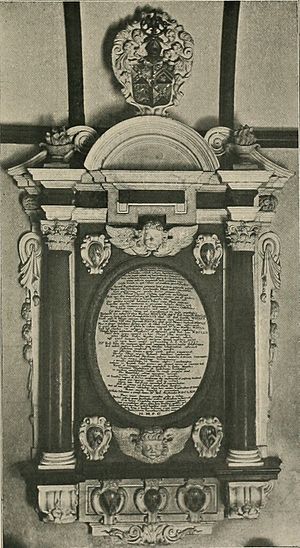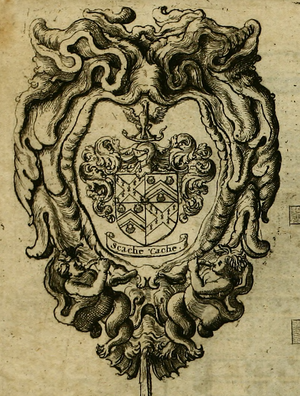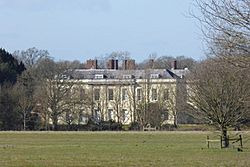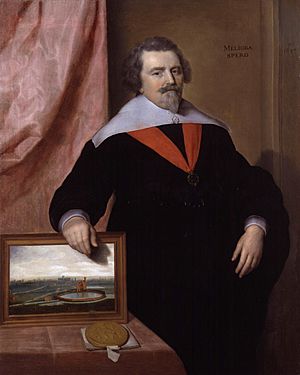Samuel Backhouse facts for kids
Samuel Backhouse (sometimes called Bacchus or Bakehouse; baptised 18 November 1554 – 24 June 1626) was an English businessman. He later became a country gentleman living in Berkshire, England. He was a Member of Parliament (MP) twice during the early rule of King James I. First, he represented New Windsor in 1604. Then, he represented Aylesbury in 1614.
Samuel grew up in the important Backhouse family from the North of England. His father was a rich London Alderman and a Grocer. Samuel studied at Oxford University. He first received land when his father died in 1580. He gained more land after marrying Elizabeth Borlase, who came from a noble family in Buckinghamshire. He bought the Swallowfield estate to live closer to his new relatives. At Swallowfield, Samuel lived as a country gentleman. He took on several small local jobs. In 1600, he even hosted Queen Elizabeth I as the Sheriff of Berkshire.
Samuel Backhouse decided to join Parliament after his success as a gentleman in Berkshire. During his first time in Parliament, from 1604 to 1610, he was part of fifty different groups called committees. However, he was not recorded as giving any speeches. In the much shorter Parliament of 1614, Samuel was named to nine more committees. Again, he did not give any speeches.
After the 1614 Parliament, Samuel did not try to be elected again. He soon went back to Swallowfield. We know he became a shareholder in the New River Company in 1619. He also had a small family disagreement about the local church. He might have also known people interested in mystical studies.
Samuel Backhouse died in 1626. His lands went to his oldest son, John. When John died without children, the lands passed to his youngest son, William. William's only child who lived longer than him, Flower, also died without children. This meant Samuel Backhouse's direct family line ended.
Contents
Early Life and Education
Samuel Backhouse was baptised on 18 November 1554. His parents were Nicholas Backhouse and his first wife, Anne. Anne was the daughter of Thomas Curzon. Samuel was born into the wealthy Backhouse family from Northern England. The first known member of this family was Thomas Backhouse of Cumberland, Samuel's grandfather.
On 27 March 1574, Nicholas Backhouse was officially given a family symbol, called a "confirmation of arms." This document said the family "long time past did come out of Lancashere where they were of worshipful degree." Nicholas Backhouse was a merchant. The document called him "of London Grocer." In 1578, he became a Sheriff and Alderman of London. A historian named C. H. Josten said that Nicholas "must have been a man of considerable wealth and standing." This means he was very rich and important.
Samuel grew up in Hampshire, near one of his father's estates. He studied at Trinity College, Cambridge University. He started there in 1569 and earned his first degree in 1573. Samuel also joined Gray's Inn in 1572, which was a place for legal training.
Becoming a Country Gentleman
Samuel Backhouse received his first large amount of land when his father died in June 1580. He inherited his father's lands in Hampshire. The next big change came after Samuel married Elizabeth Borlase on 6 September 1581. Elizabeth was the daughter of John Borlase of Little Marlow. This marriage helped Samuel become part of the important families in Buckinghamshire. That same year, he bought the Swallowfield estate in Berkshire. This purchase made sure he lived close to his new relatives. Samuel became "a man of considerable wealth." Besides his property in Swallowfield, he owned over 70 acres in Clerkenwell and Islington, which are areas near London.
At Swallowfield, Samuel Backhouse stopped being a merchant like his father. Instead, he chose to live the life of a country gentleman. His brother Rowland took over the family's business. However, Samuel did invest £240 in the East India Company in 1600, following his brother's example.
Samuel did not immediately get used to his new way of life. A friend from Oxford, John Chamberlain, wrote that in 1600-01, Samuel was "almost out of heart" (very worried). This was because he had just become the county's sheriff and heard that Queen Elizabeth I was visiting. He felt "altogether unacquainted with courting," meaning he wasn't used to royal manners. But in the end, he did "very well."
In Berkshire, Samuel held several local government jobs. He was a justice of the peace (a local judge) from 1593 until he died. He was sheriff of Berkshire in 1600-01. He was also a commissioner for people who refused to follow the official church (recusants) in 1602. In 1613, he helped collect a special tax called "aid." In 1622, he was a commissioner for sewers (waterways) in Buckinghamshire and Berkshire.
Time in Parliament
Representing New Windsor: 1604–1610
Samuel Backhouse first became an MP in 1604. He represented New Windsor along with Thomas Durdent. This was during the Parliament of King James I. Historians Alan Davidson and Andrew Thrush believe Samuel felt confident to try for this position. This was because of his success with the royal visit a few years earlier. Also, he had many relatives in Parliament, including his brothers-in-law Sir William Borlase and Nicholas Fuller. His election might also have been helped by Charles Howard, 1st Earl of Nottingham. This Earl had a lot of power in Windsor at the time.
In the first meeting of this Parliament, Samuel was chosen for nine parliamentary committees. He attended several of these with one or both of his brothers-in-law. For example, on 5 May 1604, he was on a committee with Nicholas Fuller about problems with the Exchequer (the royal treasury). On 8 May, all three attended a meeting with the House of Lords about "purveyance." This was a system where the King could buy supplies at a low price. On 26 May, they all attended another meeting about a feudal tax called "wardship."
In early 1606, during the second meeting of Parliament, Samuel was named to ten more committees. In January, he attended two committees about bills for London. These included bills about housing in the city and the River Lea's water supply. Later that month, Samuel joined his brothers-in-law to discuss a bill against the abuse of purveyance. Samuel's personal opinion was not written down. On 14 May, Samuel and other MPs were asked to deliver the House of Commons' complaints to King James I.
Near the end of this meeting, five "purveyors" (people who collected supplies for the King) secretly took wood from Samuel's estate in Berkshire. This happened early on a Sunday morning. They were taken to the Star Chamber (a special court) the next month. The court said this action broke the Magna Carta (an old English law). It was even worse because it happened on a Sunday, which was considered a holy day. All the purveyors were put in prison. The main ones had to pay fines, and their servants were put in the pillory (a device for public punishment).
Samuel's return to Parliament in late 1606 followed a case in the Court of Chancery (a court dealing with fairness). He was one of the people being sued in a case brought by Speaker Sir Edward Phelips. The third meeting of Parliament began for Samuel on 24 November 1606. He attended a meeting about the Union of the Crowns, which was about joining England and Scotland. From November 1606 to June 1607, Samuel was named to several committees for new laws. These included laws about church courts, family law, the New River Act (about London's water supply), and ensuring the lands of London's livery companies (old trade groups). On 13 June, he was on a committee to help a Berkshire gentleman sell his lands to pay off debts. This committee was the first time Samuel was recorded working with his family friend, Sir Henry Neville. During this time, Samuel and his brothers-in-law also helped write a petition about religion.
There was a long break between the third and fourth meetings of Parliament. This was due to plague, money problems, and the King's frustration. During this break, the second MP for Windsor, Thomas Durdent, died in 1607. He was not replaced until shortly before the fourth meeting in late 1610. Sir Francis Howard, a relative of Nottingham and an experienced sailor, took his place. In this fourth meeting, Samuel and Neville worked together again. On 16 February 1610, they were on the same committee to discuss the bill about William Essex. Samuel was asked to follow up on this bill on 3 May, considering changes made by the House of Lords. He was also named to look at a bill to cancel the 1606 and 1607 New River Acts. Historians Davidson and Thrush called him a "natural choice" for a bill that was against purveyance and in favor of protecting timber. In total, during this first Parliament, Samuel was named to fifty committees. However, he did not make any recorded speeches.
The Addled Parliament: Aylesbury, 1614
In the next Parliament, Samuel Backhouse represented Aylesbury. He sat alongside Sir John Dormer, a gentleman from Buckinghamshire. This area was influenced by a local favorite, Sir John Pakington. Pakington had hosted Queen Elizabeth I in a very grand way in 1603. He likely approved the election of Samuel and Dormer. Samuel's relative, William Borlase, had held this seat in the previous Parliament. Also, Samuel's supporter in Windsor, Nottingham, had gone to sea. Sir Richard Lovelace, the town's high steward, took Samuel's old seat.
This Parliament, held between April and June 1614, became known as the Addled Parliament. It was called "addled" because it failed to pass any laws or solve the problems between the King and Parliament. Just like his last Parliament, Samuel was named to nine committees but remained silent. On 8 April, Samuel was among those asked to research old rules about what was needed to become an attorney-general (the chief legal advisor to the government). He was also named to groups discussing canceling old, useless, or harmful laws. He helped assess bills to encourage keeping the Sabbath (Sunday) holy. He also worked on bills to confirm the Charterhouse hospital, cancel an old law about fish-packing, and prevent unfair customs charges. Samuel did not attend the committee for the Charterhouse hospital bill.
Samuel apparently did not try to be elected again for King James' next Parliament in 1621. However, John Dormer was elected again, this time with Samuel's nephew-in-law Henry Borlase. In 1622, the Privy Council (the King's advisors) called Samuel. This was because he had not paid the "benevolence," a special tax King James had demanded after Parliament ended. Parliament had failed to give the King the money he needed.
New River Company
After his time in Parliament, Samuel Backhouse returned to business. He became involved with the New River Company when it was officially formed in 1619. Samuel was one of the "Adventurers" (shareholders) named in the company's official document. His son John, several other relatives, and Sir Hugh Myddelton (who he had worked with in Parliament) were also shareholders.
Before this, in early 1614, while he was in Parliament, Samuel and three other investors paid a small fee. They bought a piece of land in Ware, which was at the start of the New River. Around the same time, Samuel was paid £65 by Myddelton. This payment was for using Samuel's property in Clerkenwell for the "New River head," which was where the water supply began.
Family and Personal Life

Samuel and Elizabeth Backhouse had eight children: four sons and four daughters. One of their daughters died before Samuel. Their sons were named John (born 1584), Nicholas, Samuel, and William (born 1593). In the autumn of 1607, a visitor to Swallowfield reported that Samuel suggested one of his sons marry one of Henry Neville's daughters. This marriage offer did not happen, which left Samuel "not a little perplexed" (very worried). However, this rejection did not cause lasting bad feelings between the families. Samuel was even made godfather to Neville's child the next year.
In 1618, Samuel and his family got into an argument over who owned some seats (pews) in Swallowfield church. This argument eventually went to the Star Chamber court. During this dispute, Samuel's son John attacked a man named John Phippes with a spear.
Samuel Backhouse wrote his will on 8 June 1626, saying he was "weak of body." He died shortly after, on 24 June 1626. He was buried in Swallowfield. The news of his death apparently did not reach Whitehall (the government center) right away. In February 1627, he was still named to a group in Berkshire that was collecting a special tax called the "Forced Loan."
Samuel's oldest child, John, inherited his father's estates, including Swallowfield. John followed his father into Parliament from 1625 to 1629, representing Great Marlow. John married in 1615 but died without children in 1649. Swallowfield then went to his youngest brother, William. Not much is known about Samuel's middle sons, Nicholas and Samuel. They were both alive in 1628, as mentioned in their mother's will. However, they both seem to have died unmarried before 1649, as they were not mentioned in their older brother's will.
William was the only son of Samuel's to have children: two sons and a daughter named Flower. Both of William's sons died before him. This left Flower as his only heir when he died in 1662. Flower married three times, but when she died in 1700, none of her children had survived her. This brought an end to Samuel Backhouse's direct family line.
Samuel's son, William, became a "most renown'd chymist, Rosicrucian, and a great encourager of those that studied chymistry and astrology," as a writer named Anthony à Wood described him. William later taught Elias Ashmole, a famous scholar. C. H. Josten, who wrote about William, believes that William's ancestors might also have been interested in alchemy (an old form of chemistry). He mentions an old document that says Sir Edward Dyer asked for help from Cornelius Drebbel and a "Sir S. Backus" to translate a mysterious "Dutch Cypher." If this "S. Backus" was Samuel Backhouse, it means he knew two important English mystics. This suggests Samuel himself might have been interested in these kinds of studies.
Sources
- Davidson, Alan (2010). "BACKHOUSE (BACCHUS, BACKHURST), John (1584-1649), of Sindlesham and Swallowfield , Berks. and Kingsley, Hants.". The House of Commons 1604-1629. The History of Parliament Trust.
- Davidson, Alan (2010). "New Windsor". The House of Commons 1604-1629. The History of Parliament Trust.
- "BACKHOUSE (BACCHUS, BAKEHOUSE), Samuel (1554-1626), of Swallowfield , Berks.". The House of Commons 1604-1629. (2010). The History of Parliament Trust.
- Sgroi, Rosemary (2010). "Aylesbury". The House of Commons 1604-1629. The History of Parliament Trust.
- Thrush, Andrew (2010). "The Parliament of 1614". The House of Commons 1604-1629. The History of Parliament Trust.
| Parliament of England (to 1707) | ||
|---|---|---|
| Preceded by Julius Caesar |
Member of Parliament for Windsor 1604 |
Succeeded by Richard Lovelace |
| Preceded by William Borlase |
Member of Parliament for Aylesbury 1614 |
Succeeded by John Dormer |
 | John T. Biggers |
 | Thomas Blackshear |
 | Mark Bradford |
 | Beverly Buchanan |




